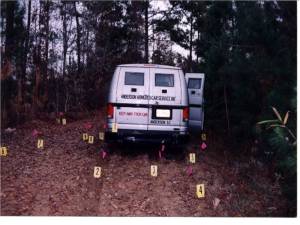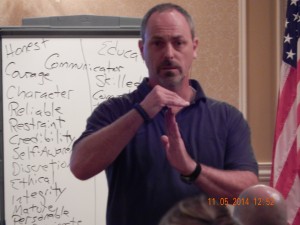Category Archives: Dynamic of Character
Like many things in life, even our character can get out of balance. For instance, the character qualities of Attentiveness (showing the worth of a person, idea, or task by giving it my undivided concentration) and Alertness (being aware of my surroundings so I can have the right response) must remain in balance. If I am so focused on you that I fail to notice a fire starting in the corner of the room, my character is out of balance. In the same way, if I am so hyper-vigilant that I cannot focus on you and what you are saying, my character is out of balance. The same thing applies to Truthfulness (earning future trust by accurately reporting past facts) and Discretion (avoiding words, actions, and attitudes that could have undesirable consequences). I can be so truthful that I unnecessarily hurt the feelings of a friend or reveal information that could place someone else in jeopardy.
Recently, I gave a character recognition to one of my colleagues with the International Police Coordination Board (IPCB) for his Availability (making my own agenda secondary to those I serve) and Dependability (fulfilling what I consented to do even if it means unexpected sacrifice). He later told me that these character qualities often get him in trouble because he spends so much time helping others that he neglects his own work. Then, he has to take his work home and neglects time with his wife and family. His character is out of balance. His Availability and Dependability are HUGE character qualities that define who he is as a true man of integrity. But they must be balanced with Discretion and Attentiveness.
I recently received this email message from a student of Police Dynamics and aspiring law enforcement leader from a western Sheriff’s Office asking for advice. I thought my other readers might like to read his request and my response…
Hi Ray,
I’ve been with the department for 6 years now in the detention facility and am now attending the Law Enforcement Academy. I have been elected as the president of my class, and am wondering if you have any guidance you can provide as to how I can be an effective leader. I know you have a lot of experience and hope that you can share some of that with me.
Here is my response…
I would be glad to help in any way that I can. Just the fact that you have sought me out shows a lot about your character and potential as a leader. First of all, good leaders are humble, teachable, and always putting the needs of others first. Leading by example is not an outdated idea. It is the essence of leadership.I have always sought to model my own leadership style after others that I admire. Historical figures, like George Washington or Stonewall Jackson, have been great inspirations to me, as well as living examples who have mentored me over the years. One caveat is that current mentors will oftentimes let you down. They are only human too. So take the good and learn from the bad that you find in them.Read, read, read. There is so much out there on leadership and I suggest you find books and/or videos from authors who you respect. Look for those that approach leadership from a character-based perspective. Steven Covey has some great stuff as does John Maxwell. Doug Dickerson, who is a frequent guest-poster on the Police Dynamics blogsite, offers an excellent book you might want to consider. I have an e-book that is available for sale on the site that you might also consider. Training courses are also good. Take advantage of all that you can.Remember this, the greatest leader who ever lived said, “I came not to BE served, but TO serve” and “He who would be the greatest among you must become the servant of all.” Follow this principle and you can’t go wrong. Look for ways to serve others, to help them achieve their goals, and to become more successful. Leadership will come when you are ready. It sounds like you are well on your way with the class presidency. Find ways to serve your fellow classmates instead of yourself and you will stand out in a positive way.Please stay in touch and let me know if there is any other way that I can help you along your path. But also remember this: the path of leadership is the path of MOST resistance. There is heartache and struggles ahead for the true leader. But for those who are called to it, there is no other way…!Ray
In this segment from the Police Dynamics Video Training Series, I demonstrate how to use the character quality definitions from the Character First curriculum to motivate and praise those under your authority.
After watching this video, every time you find yourself saying “good job” or “keep up the good work,” it should serve as a red flag. Realize that you have just praised someone for achievement instead of character, make the character connection by coming up with at least one character quality the person displayed, then praise them for the character quality as well. This will remind them to keep up the good character…!
 Shortly after I took office as Sheriff of Dorchester County, we experienced a tragic crime. An armored-car was hi-jacked and one of the guards brutally murdered. Due to an intense investigation and some top-notch forensic work, we were able to identify the murderer and successfully prosecute the case.
Shortly after I took office as Sheriff of Dorchester County, we experienced a tragic crime. An armored-car was hi-jacked and one of the guards brutally murdered. Due to an intense investigation and some top-notch forensic work, we were able to identify the murderer and successfully prosecute the case.
Right after the jury came in with their verdict, I sought out my Detective Sergeant (now a Lieutenant) who had handled the crime scene and forensic portion of the case. I knew the conviction was largely due to his efforts and I wanted to recognize him for a job well-done.
So I found him out back of the courthouse and went up to praise him as any good Sheriff should. But instead of praising him for his achievement (gaining the conviction), telling him “good job,” or “keep up the good work,” I praised him for three character qualities. By “pitching” these character qualities, right across the plate so he could catch them, I made the “character connection” and ensured that I sent the right message.
Gaining the conviction was the achievement–the fruit. Character qualities like attentiveness, thoroughness, and diligence were the seeds that produced the fruit. If you focus on the fruit and neglect the seed, you can produce a bad crop. It’s the Law of the Harvest. According to our Character Maxim, if you focus on achievement to the exclusion of character, you encourage bad character.
Watch this short video excerpt from the Police Dynamics Video Training Series as I demonstrate how to use character-based praise to encourage high achievement.
Praising character over competence requires a new vocabulary. The 49 character qualities defined by Character First provide an excellent tool.
Do you remember your first pursuit? Most police officers do. They can turn out really good or they can turn out really bad. As law enforcement leaders, we can use character-based praise to help minimize the potential disasters associated with high-speed police pursuits.
In this short clip from the Police Dynamics Video Training Series, I use the story of a Rookie’s Pursuit to illustrate just how important it is to praise the character that produced the achievement rather than the achievement itself.
In this illustration, the Rookie exercised the character quality of self-control:
rejecting wrong desires and doing what is right.
His self-control is what kept his own emotions in-check and maintained his composure so he could make good decisions under pressure.
The Character Training Institute defines Determination as:
purposing to accomplish right goals at the right time, regardless of the opposition.
Watch this heart-warming video of a young girl whose determination allowed her to overcome an incredible obstacle in order to reach her goals in life.
Click here to download the full list of the 49 character qualities and their definitions.


